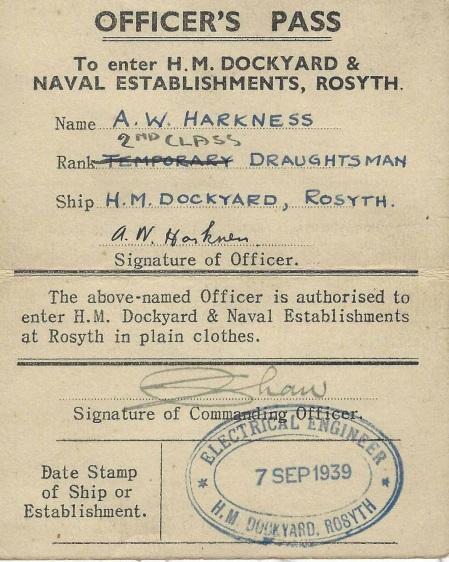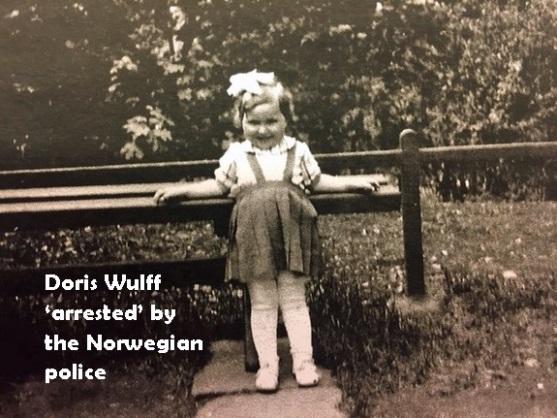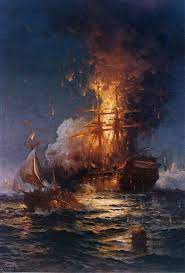Officer’s Pass
So it seems incredible that my father was given an officer’s pass 4 days later, on 7 September 1939. One doesn’t normally expect governments to respond so quickly to emergencies, especially at the start of the war. This also implies that my father worked at the naval dockyard for a period prior to the outbreak of the war. It wasn’t perhaps so ‘fantastic’ that the government responded quickly, as the war had been brewing for a long time; and perhaps, only naïve liberals like Chamberlain believed in ‘peace’. It was naive to believe that after invading Czechoslovakia and annexing Sudetenland in 1938, under the guise of uniting the Germanic peoples, that Hitler had satisfied his predatory appetite.
Plain Clothes
It states on the ‘Officer’s Pass’ that the “above-named officer is authorised to enter H.M. Dockyard & Naval Establishments at Rosyth in plain clothes.” The information given by the “Officer’s Pass” provides at least three points of interest here. First, my father works at the naval dockyard. He bought a motorbike after his mother, Georgina, died in 1934. Whether or not he still had this motorbike, or had bought a car in 1938, we don’t know. But one way or another, he would have been able to make the 16-mile journey from his house to Rosyth dockyard.
Another possibility is that he was living in digs in Stirling or in the Rosyth area. Prior to joining the RNVR, he had at one time lived in Stirling, perhaps doing some kind of apprenticeship (1932: see insurance document here).

Second, the Pass states that he is “authorised to enter H.M. Dockyard & Naval Establishments at Rosyth in ‘plain clothes’. In other words, he was not an ‘officer’ in the traditional sense; he was perhaps called ‘officer’ for official purposes. That is, he was both a civilian and an employee. This takes us to the third point of interest.
2nd Class Draughtsman
Third, he was a worker, or more specifically, a “2nd CLASS DRAUGHTSMAN”. But there is a point of doubt here. The word ‘TEMPORARY’ has been crossed out: TEMPORARY. And the word ‘2nd CLASS’ is written in a different hand than the original. In fact, ‘2nd CLASS’ seems to be written in my father’s scrawly left hand writing.10
It could be assumed that my father and mother had something in common: they were both ‘rebels’ (albeit in a quiet way). It seems they did not have that much respect for the ‘authorities’, as evidenced by their defacing/falsifying of official documents. As mentioned, my mother used a razor to cut out the words ‘domestic servant’ under the slot for ‘profession’ on her marriage certificate; my father used the more simple method of crossing one word out and writing in another. On the other hand, they were perhaps just ‘correcting’ ‘official’ errors.
This brings us back to the fact that he was classified as ‘2nd CLASS DRAUGHTSMAN’. This seems to be a designation used in H.M. Naval Establishments, and relates to a category of engineers.
Moving forward
In conclusion, this document demonstrates that my father had ties to the Royal Navy at least one year before marrying my mother and that he worked as an electrical engineer. You can read more about it [here].
10 My father was left handed and had a ‘scrawly’ writing, almost impossible to read at times. According to my younger brother Gavin, the teachers used to whack him across the knuckles if they caught him writing with his left hand. “Within the 18th and 19th centuries, left-handers got more brutal treatments because they faced serious discrimination.
During this time, several attempts were made to suppress left-handedness. Within the educational system, punishment was administered to any child that prominently used his left hand.” https://historyofyesterday.com/left-handers-once-experienced-severe-stigmatization-and-discrimination-f172c2fde6ef Read: 10 August 2022.



